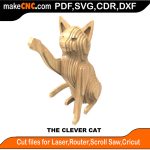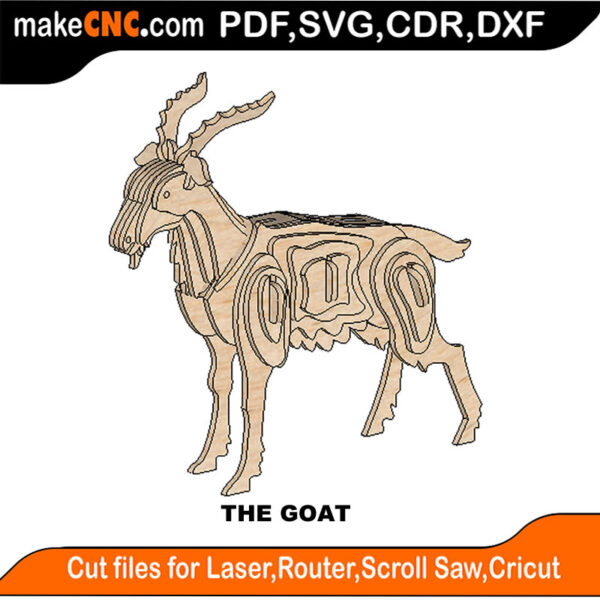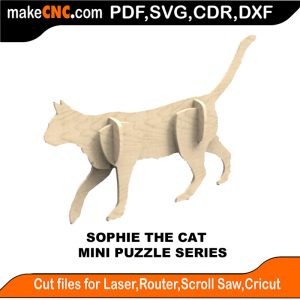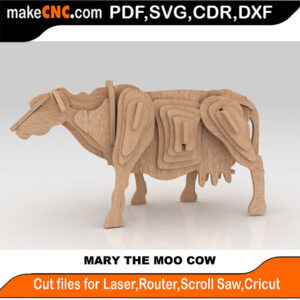The Goat : 3D Puzzle, Laser Cut, Scroll Saw, CNC Router, Template, Pattern DXF, CDR, SVG
$4.95
The Goat 3D Puzzle captures the playful and charming features of this iconic farm animal in intricate detail. Designed as a laser-cut CNC template, this puzzle offers an engaging and rewarding assembly experience. Suitable for laser cutters, CNC routers, and plasma cutters. Included file formats are SVG, DXF, CDR, and PDF. Patterns are supplied in two standard sizes, usually 1/8th (.1250) and 3mm, but are scalable vectors, allowing you to adjust the pattern size to suit the thickness of your material. Scaling up will enlarge the finished model or shrink it if you scale down. Please see our Scale Calculator to make this task simple.
Description
PLEASE NOTE THIS IS A DIGITAL DOWNLOAD PRODUCT. NO PHYSICAL ITEM WILL BE SHIPPED !
The Goat
Hello and Thanks for shopping with makeCNC!
These 3D Puzzles are a Downloadable Product that have been Designed ready to cut on any CNC router or CNC Laser Machine.
They are supplied as ready-to-cut vector files in several formats for CNC Routers, Lasers, Plasma, Die Cutters and Scroll Saws are just of the few ways you can use these Patterns.
Basic slot sizes (Meaning your Material Thickness)
1/8 Inch or 1/4 Inch
Metric: Slot Size (Meaning your Material Thickness)
3mm or 6mm
1 x Color Assembly Guide.
Number of Parts:
Finished size of Model at 1/8th or 1/4 Inch
Finished size of Model at 3mm or 6mm
L= 199
W = 51
H = 178
Approximate Size at 1/8 inch
L = 7.8
W = 2
H = 7
Approximate Size of Largest Part
3.7 X 5.9 inches
94 X 150 mm
Approximate Part Number: 39
NOTE: Our 3D Puzzles can be built in different thicknesses.
Example: 1/8″ uses 1/8″ Plywood…1/4″ uses 1/4″ Plywood, etc.
As a rule, although the slots are set to fit the same sized tool, most
people will use a smaller bit size when cutting on a CNC Router.
Copyright Policy
Respect Intellectual Property: At makeCNC, each of our digital patterns is a result of creativity and hard work. Unauthorized sharing, copying, or redistribution of our products not only violates legal boundaries but seriously impacts our community and ability to continue delivering new designs.
Current Policy: All downloadable products are copyrighted by makeCNC. Redistribution of these files in any format, other than material products made from the files, is strictly prohibited. Assembly PDFs can be sold as printed copies only alongside a finished product from the files.
Personal Use and Fair Use: You are encouraged to use our files to create as many physical items as you desire on your own machines. However, these rights are limited to personal use, not for third-party manufacturing.
Combat Piracy: We lose a significant portion of our annual income to piracy. You can help us by not participating in or encouraging the sharing or selling of our files. If you encounter makeCNC files being misused, please report them to us directly.
Legal Consequences: Engaging in piracy or unauthorized distribution of our files is not only damaging to makeCNC but is also a punishable offense under the law.
Thank You for Your Support: By adhering to this policy, you help makeCNC continue to thrive and innovate. We appreciate your understanding and cooperation.
Only logged in customers who have purchased this product may leave a review.








Reviews
There are no reviews yet.